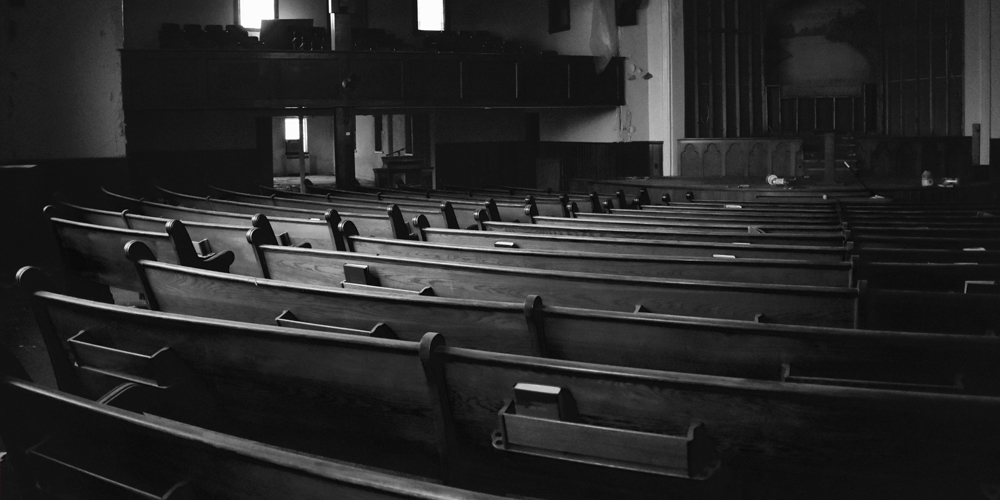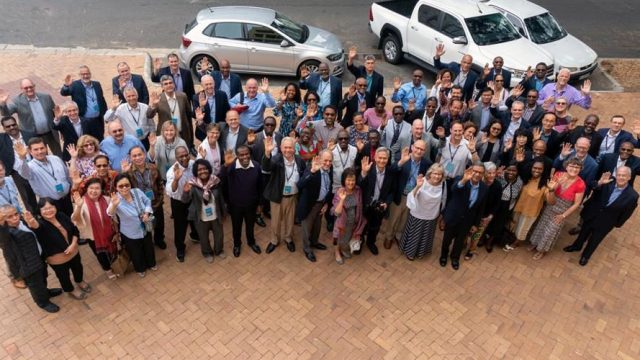What does that really mean?

“We must guard against creating extremes, guard against encouraging those who would either be in the fire or in the water.”—Ellen G. White.
I will forever remember Sabbath, March 14, 2020. It was the first time I‘d helped to organize and lead an entire worship service in front of empty pews. As a result of the executive order by the governor of the state of Maryland that there were to be no gatherings of 50 persons or more, our worship service at Spencerville Seventh-day Adventist Church moved from in-person worship to virtual worship. But I’ll also remember this Sabbath because of what took place after the service. We had just finished our prayer of thanks to God for the means to provide worship to so many—more than 350 people had worshipped with us online—and thanking the volunteers for their great efforts in pulling off a near seamless worship experience, when I was confronted by extremism!
Two men I had not met previously were waiting for me as I walked out of the sanctuary. Their purpose was to confront and chastise me.
“Pastor, why would you obey the government over God?” one of the men asked. “How have I not obeyed God?” I responded.
The man then began to recite to me the fourth commandment. I told him I knew the commandment but was not sure how we had broken it. “By not worshipping,” he said.
I told him we did worship. He said, “No, you submitted to the government’s laws over God’s laws.” I asked him to show me in the Bible where I had done that. Again, he began to recite to me the fourth commandment. I interrupted him and asked, “Does the fourth commandment say at what time of day we have to worship on the Sabbath? Does it say how many have to be gathered in order to call it Sabbath worship? Does it say we can’t utilize the modern technology we have? Does it say that families that worshipped at home together this morning or with two or three other families have not honored the fourth commandment?”
This man did not have an answer to these questions. I then said, “Of course, this isn’t the ideal; but we also have a responsibility as Christians to help protect the health of our society.”
The other young man then spoke up: “But you’re showing you don’t trust God by obeying the government. God says He will protect His people.” I smiled at him and kindly asked, “Is that why you’re wearing rubber surgical gloves and didn’t want to shake my hand when I approached you? Because you’re showing your trust in God?”
They both smiled at this. But the first man was not ready to give up the battle and tried to shift the argument again. So I referenced Paul in Romans 13:1: “Everyone must submit to governing authorities” (NLT). He tried to show me how that didn’t apply in this situation. Finally, I said, “Brother, we’re not going to agree, and I have just had a wonderful worship experience, so let’s end this.” His friend agreed and said, “Let’s go.” The brother wanted to push a little more, but at last thanked me and said goodbye.
Maybe you’re rolling your eyes at these two young men. Maybe you agree with them. I’m in the eye-rolling category, until I pause and recognize that we’re all susceptible to extremism. I would define “extremism” as holding any belief that’s not in line with the clear teachings and principles of Scripture and establishing it as not only a rule of my life, but a rule others must live by as well.
From this conversation with these young men I would like us all to consider the following points:
- When we take extreme positions, whether liberal or conservative, and hold them out to be absolutes in our lives, then we begin to try to manipulate Scripture into saying what we want it to say.
- When we defend extreme positions, we begin to argue so adamantly that we ignore the very contradictions in our own lives of the belief we hold, like the young man accusing Spencerville church of not showing trust in God, while he and his friend wore medical gloves and would not shake hands to avoid getting Covid-19.
- When we live by extremes, we’re willing to break the laws of God in the defense of our position. At the time of this writing, the government of the United States has asked us to help safeguard the health of our fellow citizens by taking specific measures, including not gathering in large groups; to disregard this request is to disregard Romans 13:1-5 and 1 Peter 2:13-17.
- Finally, confronting people with extreme positions damages our witness. If I see those young men again, I will be less likely to listen to them about any other topic; how much more so if they present their views to some within the community who are not Adventist. By being good citizens of the land, we live to witness another day.
Let’s all guard against extremism in our own lives, and may we do all we can to discourage it in the church as well.
Chad Stuart is senior pastor of the Spencerville Adventist Church in Maryland.
- Ellen G. White, Testimonies to Ministers and Gospel Workers (Mountain View, Calif.: Pacific Press Pub. Assn., 1923), p. 227.
- Scripture quotations marked NLT are taken from the Holy Bible, New Living Translation, copyright © 1996, 2004, 2007 by Tyndale House Foundation. Used by permission of Tyndale House Publishers, Inc., Carol Stream, Illinois 60188. All rights reserved.
- Ellen G. White, Testimonies for the Church, vol. 1 (Mountain View, Calif.: Pacific Press Publ. Assn., 1868), p. 361, 362. Ellen G. White wrote, “It is our duty in every case to obey the laws of our land, unless they conflict with the higher law which God spoke with an audible voice from Sinai, and afterward engraved on stone with His own finger. . . . Those who love God’s commandments will conform to every good law of the land.”
- Ellen G. White, Last Day Events (Nampa, Idaho: Pacific Press Pub. Assn., 1992), pp. 138, 139. White again gave counsel on this in regard to the Sunday laws that we foresee in the future when she wrote, “The work there must be done as wisely and carefully as possible, and it must be done in the manner in which Christ would work. The people will soon find out what you believe about Sunday and the Sabbath for they will ask questions. Then you can tell them, but not in such a manner as to attract attention to your work. You need not cut short your work by yourself laboring on Sunday.” Here Ellen White was saying if the government tells you not to work on Sunday, then don’t work on Sunday; obey the law so you can have a longer time to witness. To defy government when it is not a law that forbids our worship of the Lord as we see fit, simply to prove a point of separation of church and state, does far more injury in the long run than simply heeding the law.








